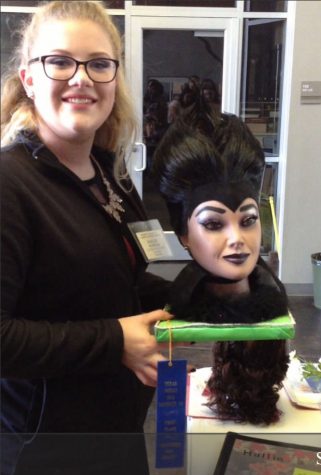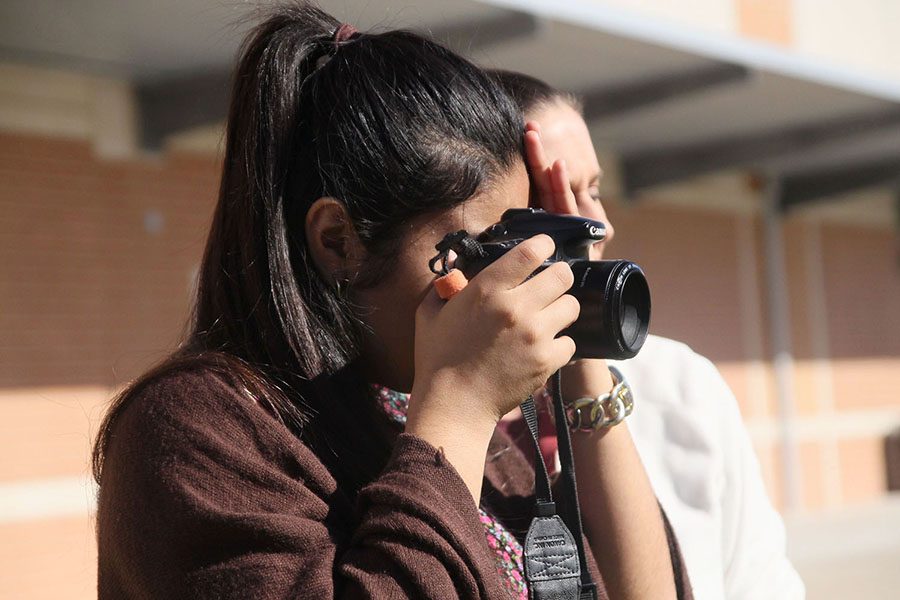Here one day, gone the next
Sub-campus students juggle classes and clubs at two different schools
Sophomore Jenavie Orta takes a picture for a class assignment in Photojournalism. Orta, who was part of the Air Force ROTC program at Leander, attended Rouse on A days and LHS on B days.
May 15, 2016
Some classmates are always seen on A days, but on B days they might as well be invisible. These people just might be some sub-campus students.
Sub-campus students are students that attend a different LISD high school on different days to take a course that is not available on all campuses.
There are 89 students that are sub-campus attending classes, including cosmetology, ROTC, construction technology, auto technology and electrical technology. Junior Jenavie Orta, who takes English, math and PhotoJournalism at Rouse, is part of the Air Force ROTC and goes to Leander High School on her B days.
“I plan to join the Navy when I am able to,” Orta said. “The Air Force and the Navy go hand in hand so getting experience now will be good.”
The ability to take these classes gives students a chance to begin preparing for their careers and give their college courses a foundation of information to build upon. For junior Josh Pasco, who plans to be a civil engineer, being able to take construction and electrical technology at Leander High School on his B days is just what he needs.
“The chance to begin learning these is extremely helpful,” Pasco said. “Having a basic understanding in college will help greatly.”
These courses also provide other requirements for jobs in that field. For cosmetology it provides experience and for construction tech it provides an entry-level builders permit. Seniors Hallie Schwab and Laurel May both went to Leander on B days for the cosmetology program. The class allowed them to improve their skills and compete at the SkillsUSA competitions. Both girls advanced to state with Schwab taking second in the Fantasy category, creating a Maleficent mannequin for the contest.
“I’m just really proud that I got to participate because I didn’t get to participate as a junior,” Schwab said.

Even with all these helpful opportunity it can be outweighed by the negatives it brings. Getting help from teachers is difficult for junior Ryan Becker who is taking construction tech on his B days at Leander.
“I’m never able to make tutorials,” Becker said. “I’m only at school every other day so I’m limited on what tutorials I can attend.”
Grades aren’t the only thing affected by only being there every other day. Social life is different too.
“Rouse is very different,” Orta said. “I feel like a foreigner.”
Even though these schools exist in same district, they have very different atmospheres. The student bodies are different, the teachers have extremely varying teaching styles, and the expressions of school pride.
“At Leander, the teachers are more laid back,” Pasco said. “Making for two different learning environments.”
Sub-campus students also have to deal with other logistical problems. Freshman Jacob Rhymer was part of the Navy ROTC program at Vista Ridge, which sent a bus over to Rouse after 2nd period on A days. But the bus only transports to and from each school, not for afterschool obligations.
“Day by day, my schedule feels smoother on A days,” Rhymer said. “But I’ve noticed how difficult it is to find transportation for sub-campus afterschool activities.”
Despite the challenges, sub-campus students say the courses are valuable for their career paths.
“Even, with difficulties getting help or being surrounded by different people the courses are good for my future,” Becker said. “The knowledge I get now will help me for when I take the courses in college. I will already have a basis going into college.”



